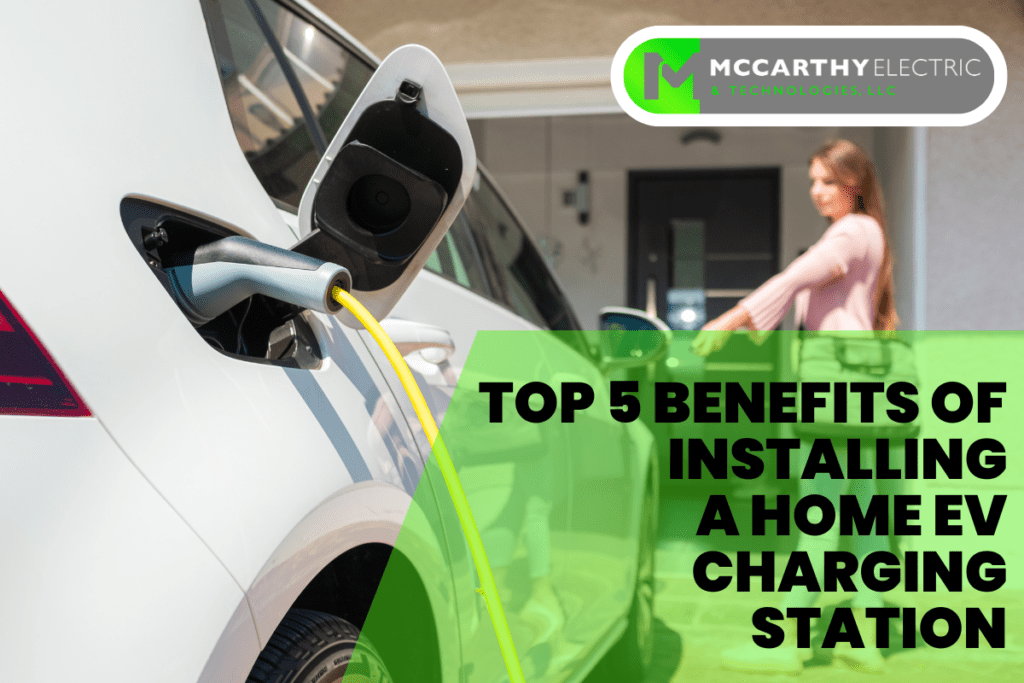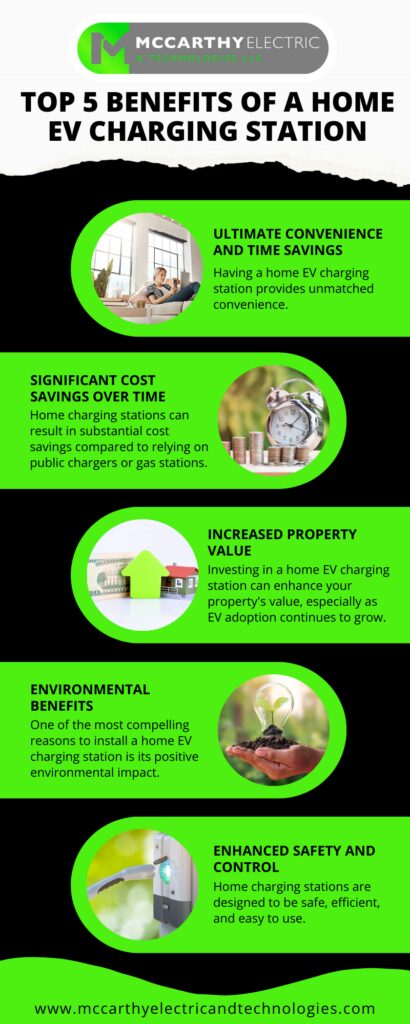Electric vehicles (EVs) are revolutionizing our drive, offering an eco-friendly alternative to traditional gasoline-powered cars. As more people switch to EVs, the demand for convenient charging solutions rises. One of the smartest investments for EV owners is installing a home charging station. In this article, we’ll explore the top five benefits of having a home EV charging station, backed by data and practical tips to help you make an informed decision.
1. Ultimate Convenience and Time Savings
Having a home charging station for electric vehicle provides unmatched convenience. No more waiting in line at public charging stations or planning your day around finding a charger. Here’s why it’s a game-changer:
- Charge Overnight: Simply plug in your EV before bed, and it’s ready to go by morning. Most home chargers can fully charge an EV in 6-12 hours, depending on the vehicle model and charger type.
- Flexibility: Charge at any time that suits your schedule. This is especially beneficial for busy individuals who can’t afford to spend time searching for public charging stations.
Practical Tip: Set your charger to operate during off-peak hours to take advantage of lower electricity rates, further increasing savings.
Data Insight: According to the U.S. Department of Energy, over 80% of EV owners charge their vehicles at home, underscoring the importance of having a dedicated home charging solution.
For more details on home EV charging installations, visit McCarthy Electric & Technologies’ EV Charger Services.
2. Significant Cost Savings Over Time
Home charging stations can result in substantial cost savings compared to public chargers or gas stations. Here’s how:
- Lower Charging Costs: Public charging stations often charge premium rates. Charging at home, especially during off-peak hours, significantly reduces the cost per mile compared to gasoline.
- Reduced Maintenance: EVs require less maintenance than traditional vehicles (no oil changes or engine repairs), and using a home charger ensures that your vehicle is always charged optimally, reducing battery wear.
Practical Tip: Use a Level 2 home charger, which is more energy-efficient than Level 1 chargers and provides faster charging times.
Data Insight: A study by the International Council on Clean Transportation found that charging an EV at home can cost up to 50% less than public charging stations.
3. Increased Property Value
Investing in a home EV charging station can enhance your property’s value, especially as EV adoption grows.
- Attractive Feature for Buyers: As more people buy EVs, homebuyers are looking for properties with built-in charging infrastructure. Installing a home EV charger now could make your home more appealing and competitive in the real estate market.
- Future-Proofing: With governments and automakers pushing for more electric vehicles, having an EV charger at home is a forward-thinking upgrade that can pay off in the long run.
Data Insight: A Zillow survey found that homes with sustainable features, including EV charging stations, sell for up to 4% more than comparable homes without these features.
Learn about our home EV charger installation services and how they can increase your property’s value.
4. Environmental Benefits
One of the most compelling reasons to install a home EV charging station is its positive environmental impact.
- Lower Carbon Footprint: EVs produce zero tailpipe emissions, and charging at home, especially with renewable energy sources like solar, further reduces the overall carbon footprint.
- Promotes Green Living: Installing a home charger encourages using clean energy and reduces the need for fossil fuels, contributing to a healthier environment.
Practical Tip: Consider pairing your EV charger with a home solar system to maximize environmental benefits and reduce energy costs.
Data Insight: The U.S. Environmental Protection Agency (EPA) states that driving an electric vehicle can reduce greenhouse gas emissions by up to 50% compared to conventional cars.
5. Enhanced Safety and Control
Home charging stations are designed to be safe, efficient, and easy to use.
- Certified Installation: Home EV chargers installed by accredited professionals, like those at McCarthy Electric & Technologies, meet all safety standards and provide built-in features like surge protection and automatic shut-off.
- Control Your Charging: Most home chargers come with smart features that allow you to monitor charging status, track energy usage, and set charging schedules through a mobile app.
Practical Tip: Regularly inspect your home charging station for wear and tear to ensure it remains in safe working condition.
Explore how our EV charger installation services prioritize safety and control.
FAQs: Home EV Charging Stations
How much does it cost to install a home EV charging station?
Costs vary depending on the type of charger and installation requirements, but on average, a Level 2 home charger installation ranges from $500 to $2,000.
Can I use a standard outlet to charge my EV at home?
While you can use a standard 120-volt outlet (Level 1 charging), it’s much slower than a dedicated 240-volt Level 2 charger, which is more efficient for regular use.
Do home EV chargers require maintenance?
Home chargers are generally low maintenance. However, periodic checks by a professional can ensure they remain in good working condition.
Will installing an EV charger increase my electricity bill?
Charging an EV at home will increase electricity usage, but it’s still more cost-effective than gasoline. Charging during off-peak hours can help minimize the impact on your bill.
Can installing a home EV charger impact my home's value?
Yes, having a home EV charger can make your property more appealing to potential buyers, particularly as EVs become more popular.
Expert Tips for Installing a Home EV Charging Station
- Choose the Right Charger: Opt for a Level 2 charger for faster and more efficient charging.
- Hire a Professional: Always hire a certified electrician to install your home EV charger to ensure it meets safety standards.
- Consider Future Needs: Install a charger that accommodates future upgrades or changes in your vehicle’s charging requirements.


